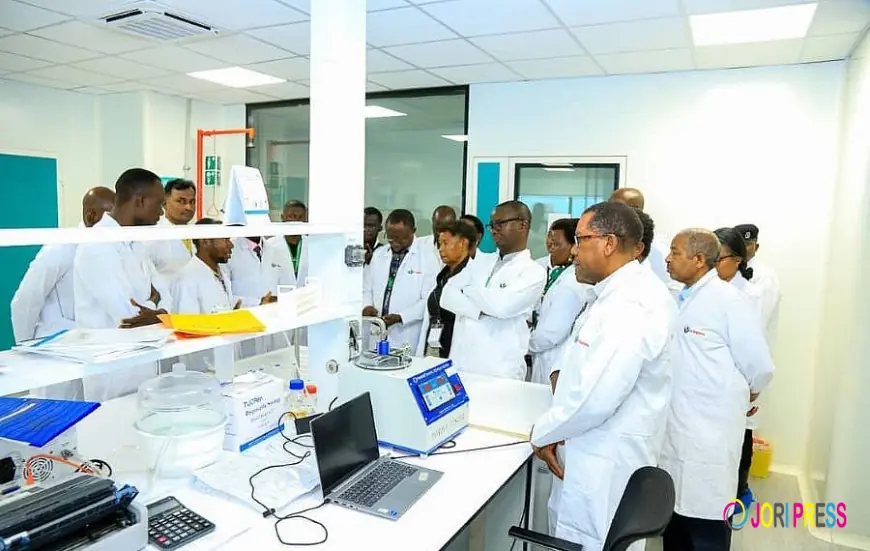Dei BioPharma’s expansion plans in research & production of health products attracts more global support.

Dei BioPharma biotech manufacturing plant has announced expansion plans to manufacture active pharmaceutical ingredients (APIs) as part of its broad strategy to establish one of Africa’s largest and most advanced pharmaceutical manufacturing hubs in Uganda and Africa.
The announcement was made on Thursday, September 19, during a high-level visit by a delegation from the Africa Centres for Disease Control and Prevention (Africa CDC) to the Dei BioPharma Drugs and Vaccines Manufacturing Facility Campus in Matugga, just outside Kampala.

Inside Dei Biopharma firm
The visit comes as the company garners international recognition for its progress in cancer research, vaccine development, and indigenous innovation.
Led by Dei BioPharma founder Dr. Matthias Magoola, the company is developing a pharmaceutical industrial park with at least 26 production units, covering a wide spectrum of medical and scientific innovations.
Dr. Magoolasaid that Dei BioPharma is committed to transforming Africa’s health sector by combining indigenous knowledge systems, modern science, and industrial innovation. He stated that the company is the first African firm to venture into API manufacturing—an essential segment of drug production previously dominated by countries outside the continent.
Dr. Magoola stated that the firm’s technology and manufacturing processes are guided by the world’s most rigorous regulatory frameworks and that Uganda is now well-positioned to play a central role in Africa’s pharmaceutical future.
“This facility is built not just for Uganda, but for Africa,” he said. “Our goal is to reduce dependency and ensure resilience across the continent’s health systems.”
The Matugga facility, commissioned in July 2021 by President Yoweri Museveni and then Kenyan Deputy President William Ruto, spans over 250 acres and hosts approximately 30 manufacturing units.
The site is designed to meet stringent international standards, including US FDA, European Medicines Agency (EMA), and World Health Organization (WHO) Good Manufacturing Practices (GMP).
The biotech firm has already set up capabilities for manufacturing a broad range of health products including generic medicines such as Paracetamol, Metformin, Metronidazole, and Doxycycline. It is also developing monoclonal antibodies like Bevacizumab and Rituximab, as well as vaccines for Hepatitis B, Hepatitis C, and Tetanus. The firm is also producing cassava-based excipients such as starch, sucrose, and fructose, alongside in-vitro diagnostic kits for diseases like malaria and tetanus.
Dr. Adrian Kivumbi Ddungu, Executive Manager for Business Development at Dei BioPharma, explained that the company’s wide product range is tailored to meet regional needs while advancing self-reliance.
The Africa CDC delegation, led by Dr. Mosoka Fallah, Director of Science and Innovation, included senior scientists from across the continent including Ethiopia, Zambia, Ghana, DR Congo, and Madagascar. They toured the Matugga campus and later engaged with officials from Uganda’s Ministry of Health, the National Drug Authority (NDA), and the Science, Technology and Innovation Secretariat under the Office of the President.
Dr. Abebe Genetu Bayih, Acting Coordinator of the Partnership for African Vaccine Manufacturing (PAVM) at Africa CDC, praised Uganda for its pioneering efforts in local vaccine production. He noted that during the early days of the COVID-19 pandemic, Uganda was the first country to formally commit to local vaccine manufacturing, with an official letter signed by President Museveni.
Dr. Bayih expressed regret for not visiting earlier but emphasized that Africa CDC is now fully committed to supporting Uganda’s pharmaceutical ambitions
He revealed that the institution has finalized a continental procurement mechanism that will create a predictable market for locally manufactured medicines by pooling demand from all 55 African Union member states, which collectively represent a population of 1.4 billion.
He stressed that this initiative is designed to prevent the recurrence of the vaccine access challenges experienced during the pandemic, when African nations were locked out of global supply chains despite having the funds to purchase life-saving drugs.
In terms of financing, Dr. Bayih announced that over US$2 billion has been pledged by the African Development Bank and other partner institutions to support African pharmaceutical manufacturers. He also confirmed that Gavi, the Vaccine Alliance, has committed US$1.2 billion in direct support for local manufacturers that meet WHO pre-qualification standards. He expressed confidence that Dei BioPharma would qualify to benefit from these funding facilities.
During the recent 5th Uganda Conference on Cancer and Palliative Care held at Speke Resort Munyonyo, Dr. Magoola revealed that his company is in advanced discussions with the Uganda Cancer Institute (UCI) to explore a partnership aimed at making cancer drugs and advanced therapies more affordable and accessible to Ugandans to address the urgent need for local, cost-effective solutions to address the rising burden of cancer across Africa.
“Cancer drugs are extremely expensive and inaccessible to the majority. More than 90% of the global population cannot afford biological cancer therapies. This is why we are leveraging advanced technology to produce these drugs locally at significantly lower costs,” he said.
What's Your Reaction?
 Like
1
Like
1
 Dislike
0
Dislike
0
 Love
0
Love
0
 Funny
0
Funny
0
 Angry
0
Angry
0
 Sad
0
Sad
0
 Wow
0
Wow
0
















































